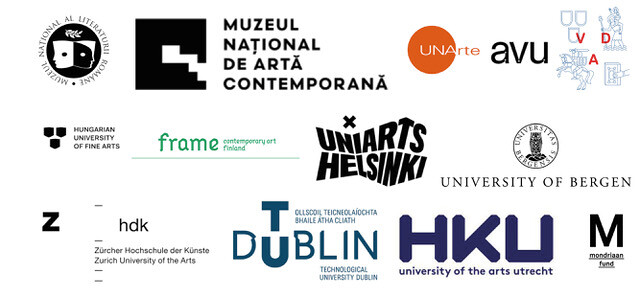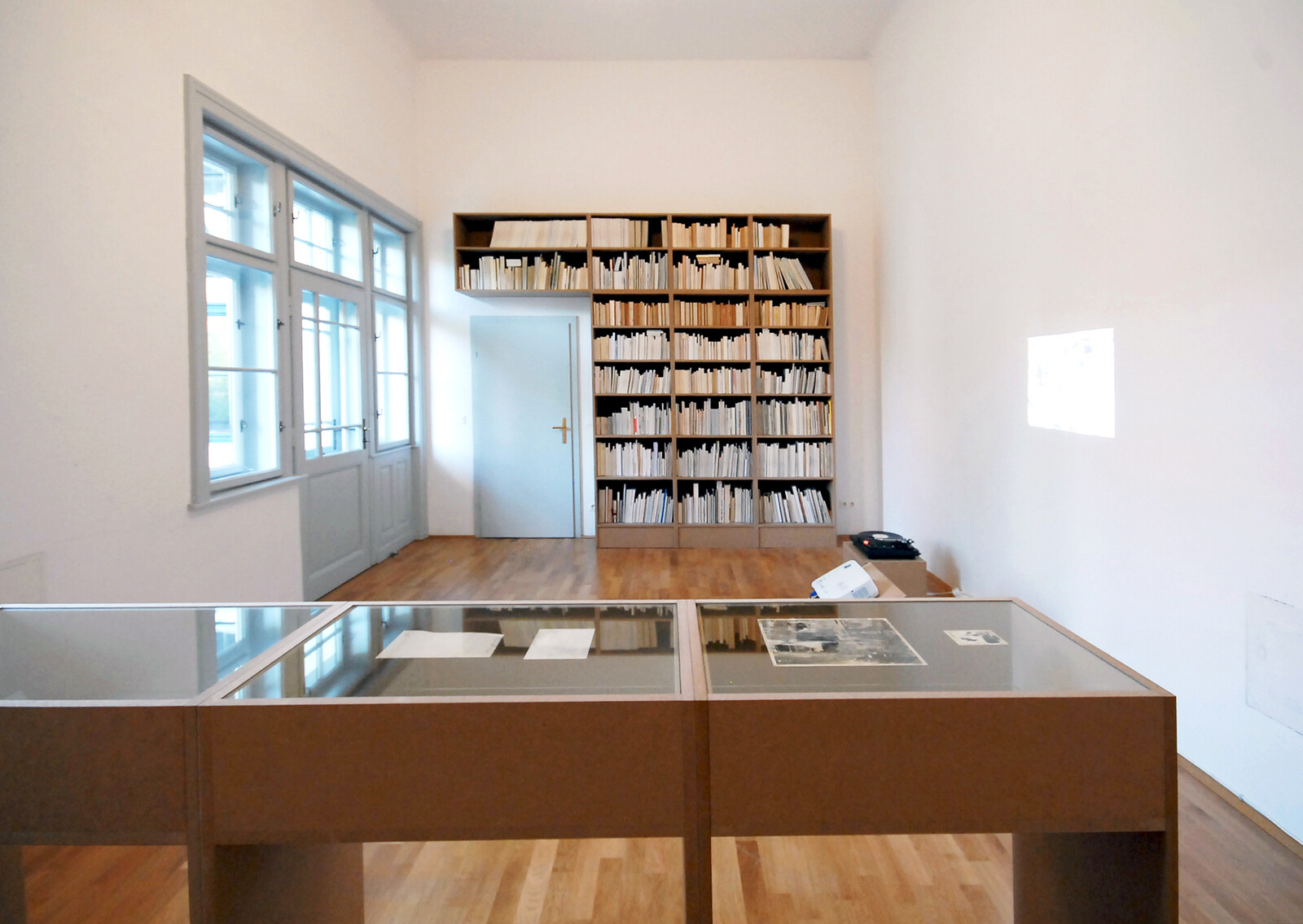September 23–November 14, 2021
Bucharest venues: National Museum of Contemporary Art, National Museum of Romanian Literature, National University of Arts, National University of Music, and UNAgaleria
This curatorial project, conceptualized by Henk Slager, questions the dominant trend of academized research—that has reigned now for at least ten years—similar to how Paul Feyerabend once questioned the dominance of rational knowledge in Farewell to Reason. Today the danger lurks that “artistic research” will be encapsulated by academic routines and institutional stereotypes which will seriously impede creativity and artistic reflection. How do we prevent the fundamental dynamics and transformational potential—often described as processes without a protocol—of an as yet productive field from eventually becoming part of a hegemonic, controlling machine as a result of methodological processes of normalization? Could a “farewell” to such gentrified artistic research produce novel forms of articulation while proceeding from the perspective of contemporary art? Above all it needs to be emphasized that, in line with Feyerabend’s treatise, “farewell” should not be seen as a denial of importance, but particularly as showing the limitation of being increasingly institutionalized. To say farewell is not a departure, but a re-visit and a re-start.
BB9 program
The curatorial project “Farewell to Research” has originally been developed for the 9th edition of the Bucharest Biennale. The proposed program consisted of a series of experimental, process-based trajectories including keynote statements, research labs, performative events, research screenings, research seminars, and publications, all pointing to artistic research as a practice that could designate creative propositions for thought in action. These activities were planned for the spring of 2020, but due to the COVID-19 situation, only the discursive program (online) organized at the Goethe-Institut Bucharest could take place: a curatorial workshop Handful thrown into air and scattered over earth (in collaboration with HDK Valand, Gothenburg University: Mick Wilson); and a curatorial symposium Contemporary Art Biennials—our hegemonic machines in states of emergency (in collaboration with OnCurating, Zurich University of the Arts: Dorothee Richter and Ronald Kolb).
Publication
In the original plan, the MaHKUscript publication would primarily be a process document. The various research lab activities, the performative interventions, and the reflective feedback would all be part of it. Circumstances forced an editorial revision: during the COVID-19 year 2020, the publication After the Research Turn started to be worked on. This was completed in December 2020, and formed the departure point for a conversation about an adjusted research lab and a different interpretation of a performative symposium.
Research Lab
At the core of the initial Farewell to Research proposal was an exhibition in progress, where fourteen selected researchers from eight doctoral programs (University of Bergen, Bucharest National University of the Arts, Hungarian University of Fine Arts, TU Dublin, Uniarts Helsinki, Academy of Fine Arts Prague, Vilnius Academy of Arts, Zurich University of the Arts) had been invited to participate. In the new setup, the participants were asked to develop a proposition (both performative and exhibitionary) which could further articulate the hypothesis and narrative of the curatorial project.
Research Lab: exhibition
Opening: September 23
Arnas Anskaitis (Vilnius), Erick Beltran (Helsinki), Soren Thilo Funder (Bergen), Irina Gheorghe (Dublin), Anawana Haloba (Bergen), Eva Bubla (Budapest), Stephanie Misa (Helsinki), Cornel Moraru (Bucharest), Tomáš Moravec (Prague), Laura von Niederhausern (Zurich), Tra Thi Thanh Nguyen (Budapest), Lea Rasovsky (Bucharest), and Kai Ziegner (Zurich).
UNAgaleria
Strada Băiculești 29, Bucharest
Research Lab: performative conference
October 4 and 5, 1–6pm CET
During two days an experimental conference will take place in the material context of the display system. Here the participants in the research lab present their performative propositions with the aim of providing an impetus to future research imaginaries in line with the exposition of their individual research. After the presentations, feedback will be given by Tiong Ang (Utrecht), Ondrej Buddeus (Prague), Jeremiah Day (Berlin), Ruxandra Demetrescu (Bucharest), Mika Elo (Helsinki), Azadeh Fatehrad (London), Falk Hubner (Utrecht), Frans Jacobi (Bergen), Ronan McCrea (Dublin), Vytautas Michelkevicius (Vilnius), Giaco Schiesser (Zurich), and Mick Wilson (Gothenburg).
UNAgaleria
Strada Băiculești 29, Bucharest
National University of Music
Strada Știrbei Vodă 33, Bucharest
Online participation available here. Password: farewell
Research screenings
October7–November 14
How could artistic practice articulate topical conditions and encourage rethinking the concept of research? And also: how could such a recalibrated concept which—according to the proposition of this curatorial project—is presented as an intersection of creative practice, artistic thinking, and curatorial strategies contribute to dealing with the urgencies that present themselves at this very moment. The following artists provide a series of constructive and inspiring hints: Silvia Amancei & Bogan Armanu (Bucharest), Ursula Biemann (Zurich), Henna Halonen (Helsinki), Hristina Ivanovska (Skopje/Vienna), Falke Pisano (Rotterdam), and Janis Rafa (Athens).
National Museum of Romanian Literature
Strada Nicolae Crețulescu 8, Bucharest
Gustafsson&Haapoja (Helsinki/New York)
National Museum of Contemporary Art
Izvor 2-4 St. Bucharest
Epilogue
Tiong Ang & Company’s (Amsterdam) The Second Hands is a complex, collaborative investigation based on encountering exchange and tension, as a journey across European borders, forming a tribute to freedom of movement and opposition, and generated by a constellation of diverse artistic capacities and perspectives. Structured towards a road trip, a collective film production, and a performative congregation in an architectonic construction, the pandemic made the workflow turn into a hidden campsite of impossible gestures and unheard voices for more than a year. The Second Hands introduces anxiety, divergence and suspension as crucial starting points, embodied by the parking lot and archive space of MNAC Bucharest and an online platform. The performance and installation are planned for 2022.
This project is made possible thanks to the support of University of Bergen, Bucharest National University of Arts, TU Dublin, Frame Finland, Uniarts Helsinki, HKU University of Arts Utrecht, Hungarian University of Fine Arts, Mondriaan Fund, National Museum of Contemporary Art, National Museum of Romanian Literature, Academy of Fine Arts Prague, Vilnius Academy of Arts, and Zurich University of the Arts.



